In a sprawling four-hour study session Tuesday night, City Council started to tackle one of the most daunting issues they face: whether to increase the living and minimum wages in West Hollywood despite an economy that is driven by the service sector which includes “tipped” employees.
With the dust yet to settle from a contentious hotel ordinance that pitted business and labor interests against one another, the debate over wages is further deepening the divide between the two factions.
Earlier this year, City Council directed staff to evaluate an increase in the living wage requirement, and whether to impose the requirement on the city’s development agreements, as well as whether to institute a municipal minimum wage requirement.
Living wage is defined as the minimum income necessary for a worker to be able to meet basic needs for an extended period of time; minimum wage is the lowest hourly wage an employer can pay an employee working for employers with 25 or fewer employees and $14 per hour for those working for employers with 26 or more employees.
West Hollywood does not currently have a municipal minimum wage rate of its own. The federal minimum wage is $7.25 per hour; Los Angeles has set a rate of $15 per hour.
In 2016, WeHo’s city council had begun pursuing a minimum wage rate when the state of California instituted a rate of its own which was higher than what they were aiming for. Now, WeHo follows the state’s rule of $13 per hour for employers with 25 or fewer employees and $14 per hour for employers with 26 or more employees.
The city first adopted a living wage rate in 1997, which applied to workers hired by city contractors. There is no “official” living wage rate — cities determine it individually based on a wide variety of data and sources. MIT’s Living Wage Calculator, for example, sets the living wage rate in L.A. County at $19.35 per hour for a single adult with no children.
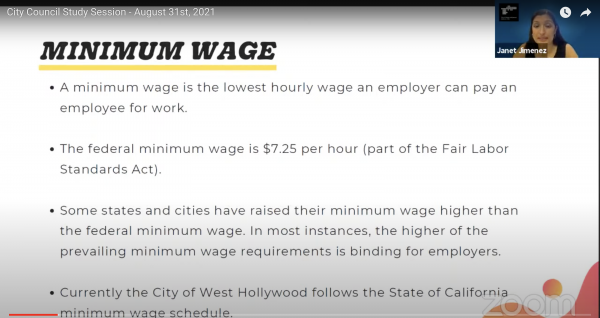
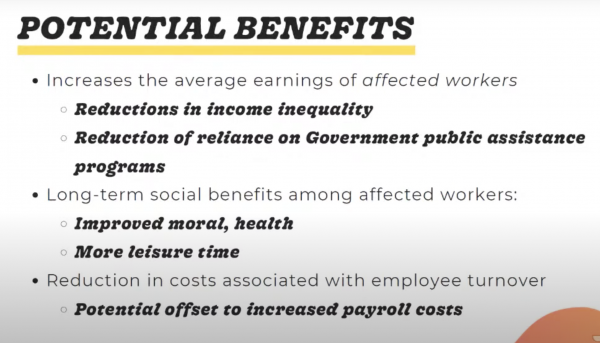
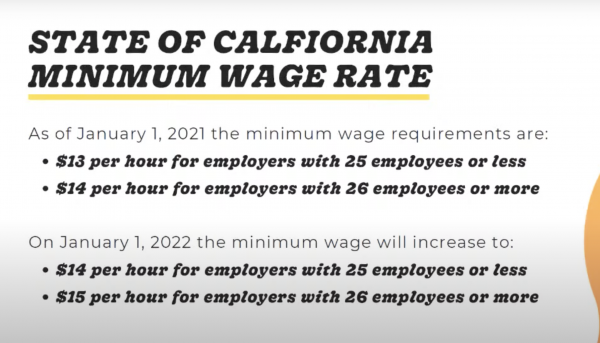
West Hollywood’s current living wage rate is $13.91 for employees whose employers provide health benefits and $15.16 for those whose employers don’t. The rate increases annually based on the consumer price index.
The two opposing sides of the debate made themselves heard during public comment at the meeting.
Councilmember John Erickson, a staunch supporter of higher wage for the hotel workers and within the development agreements seemed to lose sight of the effects on our local social services. If the ordinance is implemented city contractors and service providers would be forced to increase the pay within the current fiscal year. Mayor Lindsey Horvath pointed out that those increases may affect the amount of services these organizations are able to provide due to limited budget constraints and the pressures of the Covid pandemic on these social service organizations. City Manager David Wilson noted that the fiscal year begins in July for most social services contracts and asked staff to come back with a report at the 2nd reading of the ordinance.
“The goal is to make the living wage at least $19.35″ by Jan. 1, Erickson said in his directive to staff members, along with embarking on a fiscal impact study and a timeline. The split in wages between employees offered health benefits and those who are not would also be removed after Councilmember John D’Amico carefully pointed out the differences in how large businesses often deduct the cost of health care from the employees paycheck.
The motion directs staff to have an ordinance in place by Jan. 1, 2022 leaving local businesses little time to plan staffing and other needs. The Chamber of Commerce had asked for an economic study to weigh impacts on our local restaurants and service economy but the council decided to move forward with staff outreach to local businesses but without a survey that includes local restaurants.
The minimum wage for all hotels workers will be $17.63 per hour — a rate which D’Amico questioned.
“I think we should think bigger and think wiser than maybe even some of our staunchest advocates because they have their own concerns and they are about a micro micro moment in the city’s history and our longevity and long history of meeting on this is I think bigger than $17.63,” he said.
During deliberations D’Amico addressed Erickson and Danielle Wilson directly, questioning why Santa Monica’s ordinance was being looked at as a standard.
“I’m not really sure what this fanaticism about Santa Monica is,” he said. “I mean I don’t know what $17.63 means. It sounds to me like you should have a $20 minimum wage but if $17.63 is the one that UNITE HERE is pushing — and they’re the experts clearly — but it just seems to me like for some reason this fetishization of what they do in Santa Monica … that is a city that has almost nothing to do with us.”
“I’m willing to do what you want, John,” D’Amico told Erickson. “I mean you have a much clearer line of communication with Danielle at UNITE HERE than I than I do. But in my mind we have actual questions about what it means to pay people who work in our city. Yes, we have a big surplus. I am interested in how we roll this out. I think it’s fair to our businesses to give them the kind of warning the state discussed when it made these decisions. I think there are good reasons to think carefully about how quickly we move. It’s likely that it won’t be fast enough for some, and it’s likely that it will be too fast for others, which means it’s probably going to be the right speed.”
Speakers during the study session included representatives from the AFL-CIO, Stonewall Democratic Club, Equality Californai and many UNITE HERE! union workers who talked about the Santa Monica ordinance.
Staff members will return with council’s requested revised reports in October.
The motion’s directions to staff included provisions on these topics:
- Living Wage: Consider increasing to at least $19.35 per hour with no distinction between whether insurance is offered or not with staff to come back with fiscal impacts and a timeline for phasing with an analysis to understand impact to city budget and social service agencies.
- Minimum Wage: Apply the CPI above the state minimum wage on January 1, 2022, and with the same CPI increase every year moving forward for employers with 26 employees or more, with employers who have fewer than 26 employees would remain at state minimum wage for 2022 until 2023 when CPI would be applied.
- Conduct a study in months ahead to understand impacts of a potential “bolder” new citywide minimum wage that may be significantly higher than state minimum with CPI increase. The study would include community outreach and analysis by city staff of financial impacts including related potential increases to minimum salaries.
- Hotel Minimum Wage: create a new hotel minimum wage that would begin at $17.64 per hour (that would align with Los Angeles and Santa Monica) which would go into effect on January 1, 2022; would increase by CPI each year subsequent.
- The council will study moving the hotel minimum wage even higher ($20 an hour was used as an example) upon more study which would occur in the future.
- Sick Time: for Hotel Workers, the minimum would move to LA standard of 96 hours paid sick time with an additional 80 hours of unpaid sick time available. For all other businesses with 26 employees or more, it would move to 72 hours of paid sick time with 40 hours of paid sick time for businesses with fewer than 26 employees.
- Other Santa Monica provisions to be included: learners’ provisions, nonprofit provisions, definition of employee, limited provisions for transitional job programs, service charges being classified as belonging 100% to employees, collective bargaining agreement exemption, a regulation governing the number of employees that should be used based on 2019-2024, and then using prior year post 2024.
- Outreach & study for further wage increases: conduct an economic study, utilizing Berkeley or UCLA labor study, and establish a working group consisting of employers and labor/advocacy groups to study potential increases
- Development Agreement wages and provisions: to be considered by council on case by case basis
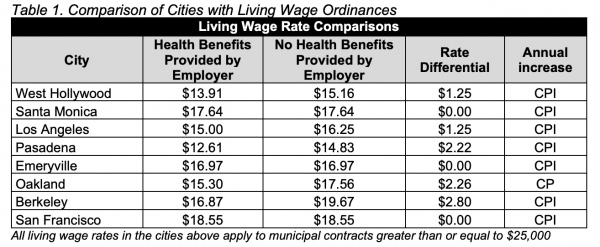
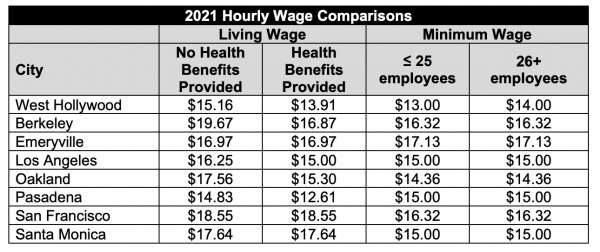
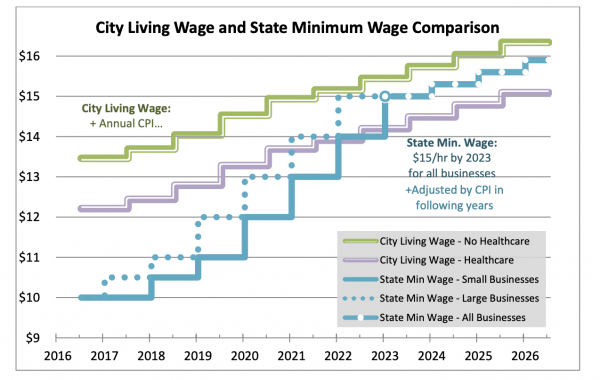
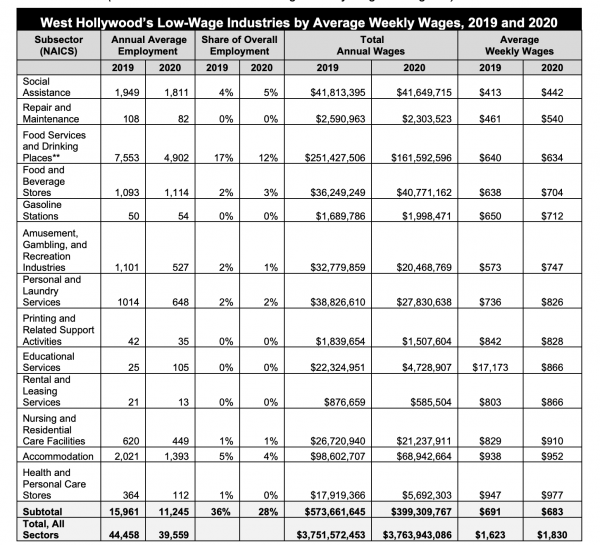
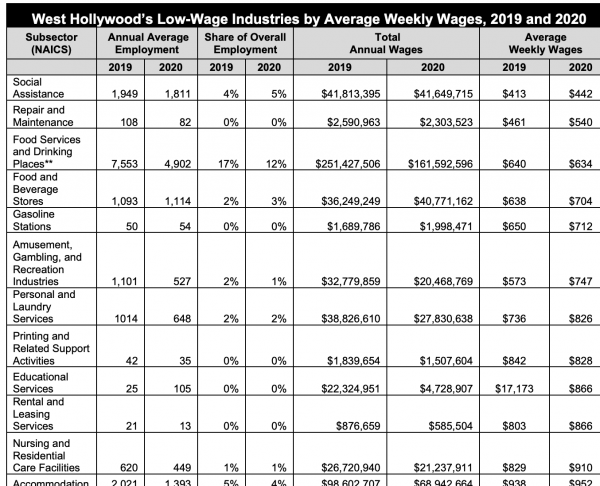

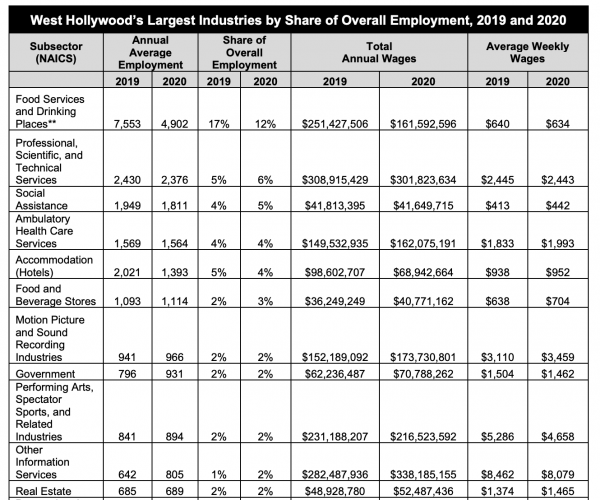
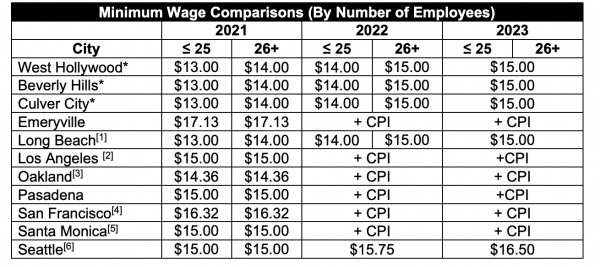
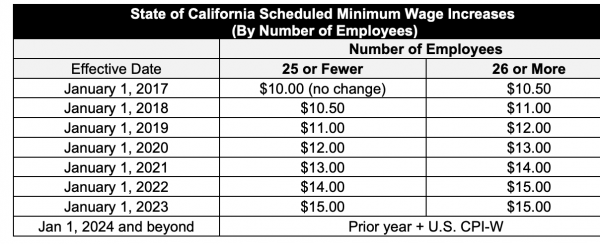

[…] Chamber has vocally opposed a number of moves by City Council this year, including new restrictions on hotel workers and wage standards which the Chamber says are hurting small businesses still struggling from the […]
[…] Chamber has vocally opposed a number of moves by City Council this year, including new restrictions on hotel workers and wage standards which the Chamber says are hurting small businesses still struggling from the […]
I lived and Managed Hotels in WEHO for 20 years. Our turnover in staff was less than 2%. Yes employers do focus on staff. We have great people that have worked at the hotels for many years. If people are not making money or unhappy in their jobs they look elsewhere, 98% did not. What you do not understand is it costs a business more to replace staff than to take care of the ones they have. The service industry is the driving sector of business to WEHO and the largest contributor to the City budget, this includes hotels, restaurants,… Read more »
Go for $20 an hour. And go for these hotels on Sunset Boulevard. Run by CEOs making millions of dollars. These are chain hotels. Go for it.
Especially the Sunset Tower. Where that guy, the owner, lives with his partner in a 17 million dollar home in Beverly Hills.
It’s time to go for the jugular.
“That guy, the owner” would be Jeff Klein, the owner of a Historic Landmark that also restored another landmark, The San Vicente Inn from the Sherman Era. Please tell us what you have done for the community. except complain and degrade others. Not a pretty picture.
Santa Monica probably provides only useful reference point for these sorts of issues in that of all the cities in Los Angeles County, it is the city that is most like West Hollywood in the nature of its’ economy. While we don’t have to slavish follow Santa Monica we can draw relevant references from their experience. From the bits of the staff report reflected in this article, the report does not inspire a lot of confidence with sloppy mistakes like mis-spelling California or asserting that an increase in the minimum wage will increase the “morals” of affected workers. Given that… Read more »
I am happy they did this. I’m glad to spend money at a business that pays its employees at least a semi-livable wage.
This ordinance is one among several recent pieces of Vanity Legislation put forth by our city council with little study, input or consideration of the impacts on businesses and residents. It must be remembered that West Hollywood is a 1.9 square mile island surrounded by Los Angeles and Beverly Hills and when policies such as this hotel ordinance makes it much more expensive and restrictive to do business in West Hollywood businesses will cease to want to be here and residents will have to incur the higher costs of purchasing goods and services here or the inconvenience of having to… Read more »
I submit that we disband the city council and turn it all over to Danielle Wilson who has already been afforded elevated status on council dais (in the form of zoom camera time). I am pro-labor and pro-union. However, government has a limited role in unions and that role is simply to ensure they can operate in fairness by a set of rules that even business has to abide. Government’s role is not to do a union’s bidding. Keith is right, the phrase “social justice” has been bastardized by the political resume building exercises of some on council, the same… Read more »
[…] Source link […]
What does this do to address the HOMELESSNESS ISSUE in WeHo? We need affordable housing in WeHo! Right now someone needs to make $30 to afford a studio appt. Are they going to raise the wage to $30/hr?
Yes affordable housing! Meanwhile make everything else less affordable!
Unfortunately, the leaders of the “Creative City” haven’t had an original idea in a very long time. Looking to Santa Monica for guidance is really a curious look. Any chance the Unite Here folks can present their entire wish list at a Council meeting, so that we can understand what Erickson’s next grand gesture is going to be?
Does anyone else find it weird that local policy is being dictated by the UNITE HERE union?
It is very, very disturbing that the union seems to be having more and more influence on certain city council members. Not. Good. Remember that come election time
Another solid reason to avoid shopping at overpriced West Hollywood businesses. I shopped locally for 18+ years, but the price increases brought on by recent city council decisions–not to mention the sales tax increase–makes it ridiculous to shop in West Hollywood.
Yup. And it’s interesting that they keep pushing for affordable housing but the people that move into these affordable units won’t be able to buy groceries in this town, go out to dinner in this town, or go shopping for incidentals because everything is so damn expensive.
Yep. My family and I have stopped doing any shopping in West Hollywood.